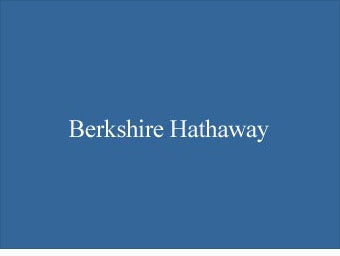Over on MarketWatch, a site run by the Wall Street Journal, Paul Merriman recently published an article entitled Warren Buffett: More myth than legend. With a bombastic title like that it’s no surprise that the article is one of the most viewed on the site. The main argument of the article is this: over the last 15 years Berkshire Hathaway Inc. (NYSE:BRK.A), Warren Buffett’s company, has seen its stock rise at a lower rate than a group of value orientated funds. The author says this:
For my money, I have to wonder whether Warren Buffett is as good as he is made out to be. If his management really “adds value” to value investing, why don’t his results at least equal the performance of passive value index funds?
In making this argument the author forgets one very important thing.
Stock performance and company performance are not the same
In Warren Buffett’s annual letter to shareholders the Oracle of Omaha stresses that the book value per share is the most useful, albeit imperfect, measure of the underlying value of Berkshire Hathaway Inc. (NYSE:BRK.A). Since the beginning of 1998 Berkshire Hathaway Inc. (NYSE:BRK.A)’s book value per share has increased at an annualized rate of about 9%, outpacing half of the value funds mentioned in the article. Of course, comparing Berkshire Hathaway Inc. (NYSE:BRK.A) to an emerging market ETF is a bit dubious to begin with.
The author claims that the stock has risen at an annualized rate of just 5.3% in the 15 years ending on June 30, 2013, and that’s true. But choosing arbitrary time periods for comparing investments is a deceptive practice. If instead you look at the time period between Jan 1, 1998 and Jun 30, 2013, beginning six months before the article’s time period, the annualized return for the stock was a far higher 8.9%. Why so different? Because the author happened to choose a beginning date which came immediately after a huge run up in the share price.
If you listened to Buffett and used the book value as a guide to the value of the company you would have never bought shares after that run up. Here’s why:
BRK.A Price / Book Value data by YCharts
The price/book value was at historic highs. The stock has done poorly during this arbitrary time period simply because it was overpriced in the beginning. If the author had chosen a 20 year window instead of a 15 year window the annualized return during that time would have been 12.3%.
When a slight change in the time period used completely changes the results it’s pretty clear that the argument is nonsense.
Another example
Networking giant Cisco Systems, Inc. (NASDAQ:CSCO) is another good example of confusing stock performance and company performance. The stock has been essentially flat over the last decade, trading within a range between $15 per share and $30 per share for much of the time.
This had led many to declare that since Cisco Systems, Inc. (NASDAQ:CSCO) stock hasn’t done anything in the last decade it will surely do nothing in the next. Those people often assume that the company has done poorly over the last ten years.
This couldn’t be further from the truth. Since the end of fiscal 2003 through the end of fiscal 2012 Cisco Systems, Inc. (NASDAQ:CSCO) has increased revenue at an annualized rate of 10.4% while increasing EPS at an even faster rate of 12.9% annually. So why did the stock do nothing? Because it was outrageously overpriced 10 years ago. EPS in fiscal 2003 was just $0.50, yet the stock traded as high as $25 per share towards the end of the year. That’s a P/E ratio of 50.
Today, the story has changed. Cisco Systems, Inc. (NASDAQ:CSCO) has not only increased its earnings but also built up an enormous pile of cash. Adjusting for that cash the current P/E ratio is just 10.4 using TTM numbers. Cisco Systems, Inc. (NASDAQ:CSCO) stock has spent the last decade trying to justify its valuation, and now the stock is far less expensive than it was a decade ago. There is no reason to believe that the stock will continue to do nothing.
The bottom line
Choosing a starting point when a stock was clearly overvalued can skew the results dramatically. Had the author chosen a 20 year window instead of a 15 year window his results would have been exactly the opposite. Now, you can certainly argue that Berkshire Hathaway Inc. (NYSE:BRK.A) has slowed down as it has grown, but claiming that Buffett is more myth than legend based on an arbitrary time period is sloppy at best and deceptive at worst.
The article Warren Buffett Is Not a Myth originally appeared on Fool.com and is written by Timothy Green.
Timothy Green owns shares of Cisco Systems (NASDAQ:CSCO). The Motley Fool recommends Berkshire Hathaway and Cisco Systems. The Motley Fool owns shares of Berkshire Hathaway. Timothy is a member of The Motley Fool Blog Network — entries represent the personal opinion of the blogger and are not formally edited.
Copyright © 1995 – 2013 The Motley Fool, LLC. All rights reserved. The Motley Fool has a disclosure policy.








